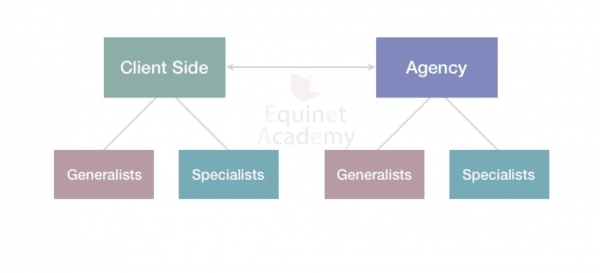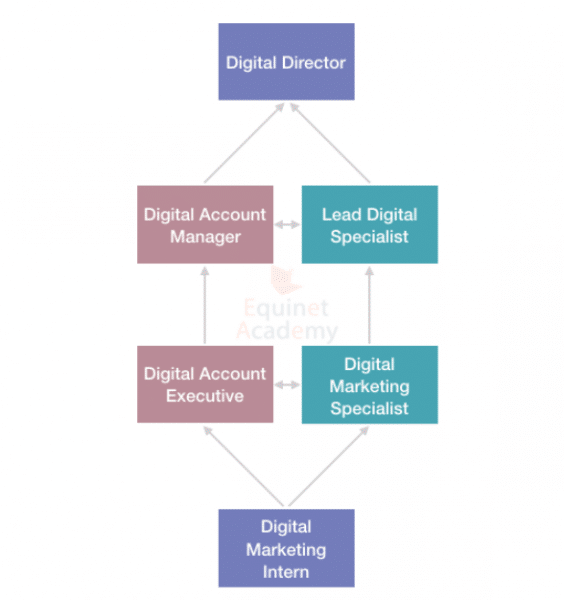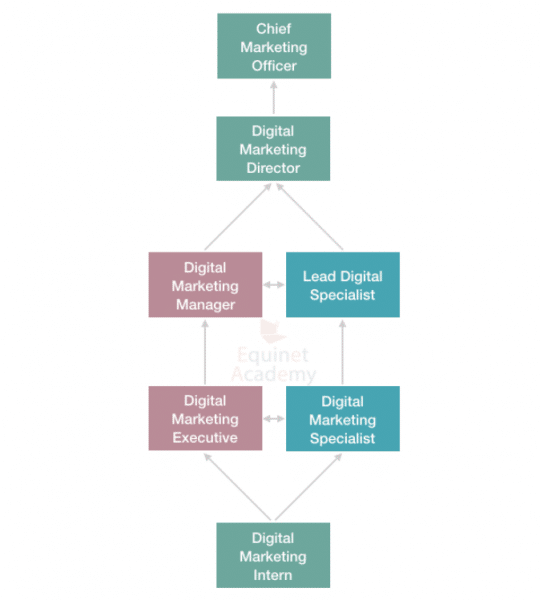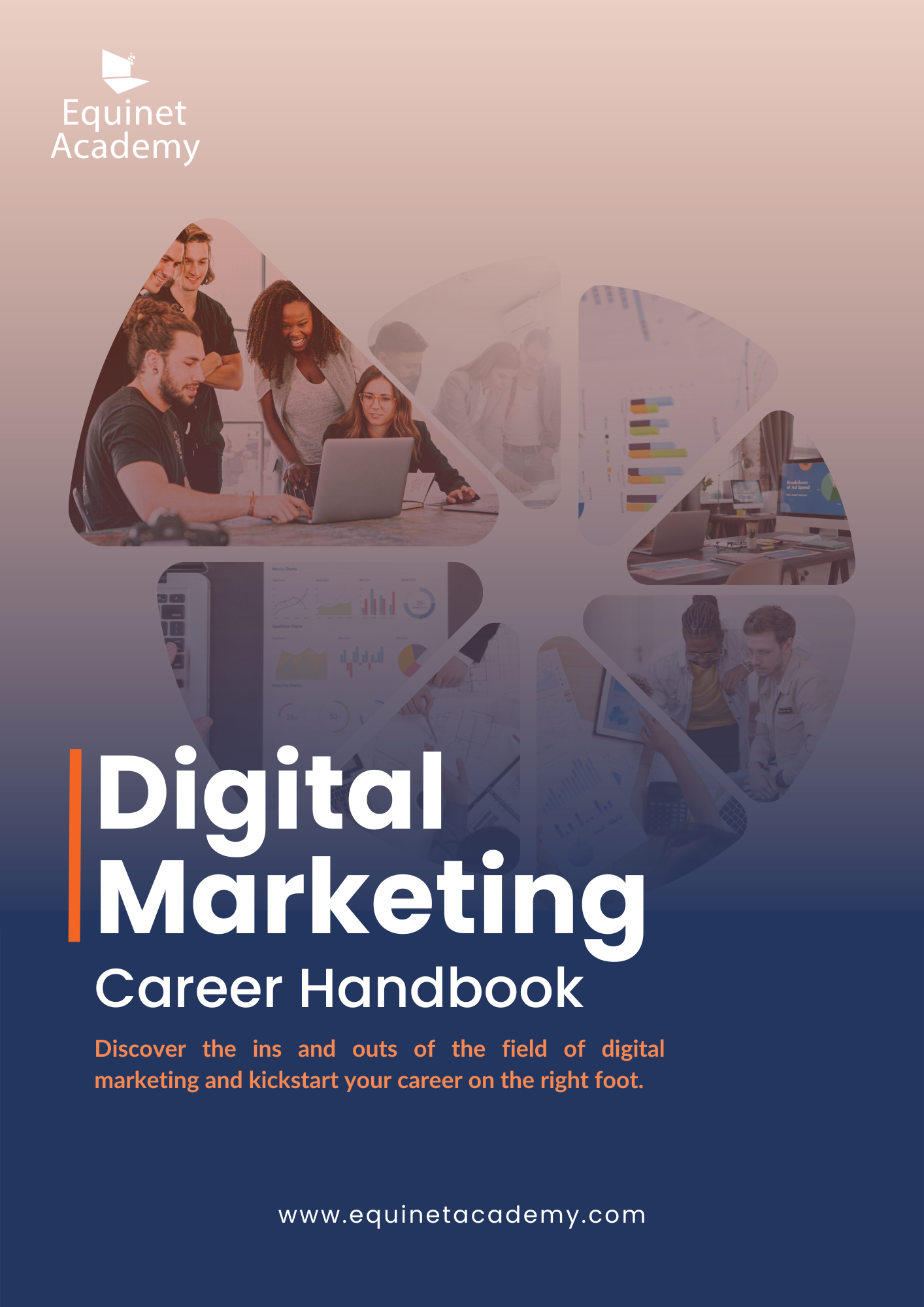Digital Marketing Career Progression
Understand the career pathways a Digital Marketer can progress towards.
Introduction to Digital Marketing Career
Digital marketing is an umbrella term that describes any form of marketing activity incorporating any aspect of digital technology. Examples of activities performed by digital marketers include increasing a website’s visibility on the search engine results pages (SEO), creating and distributing engaging content through social media platforms (Social Media Marketing), and running digital ads across the web and mobile (Digital Advertising).
Unlike traditional marketing, digital marketing is primarily data driven. Key decisions are made following careful data analysis of historical campaign performance and conducting marketing experiments such as A/B tests.
Why Get Into Digital Marketing
Digital marketing is a fun and exciting yet challenging and competitive field. There is always much to learn and experiment with since trends shift and new technologies emerge at breakneck speeds. The digital marketing industry has become increasingly competitive over the years, which is good news as this means plenty of opportunities exist. However, one has to be equipped with the right skill sets and be willing to work very hard to progress far in this field.
Experienced digital marketers are highly sought after and can easily apply for positions across different industry sectors. However, there seems to still be difficulties in hiring skilled digital marketers attributable to the rapid evolution in digital technology according to The Drum.
As Roy Wee, Digital Director at Raffles Medical Group highlighted:
“One should aim to cross over to different industries throughout his/her career while still seeking roles in digital marketing. A digital marketing professional working in the health sector for more than a decade may find it harder to secure a digital marketing role in a different industry compared to another who had transitioned across three different industries over the same period.”
A career in digital marketing can be a lucrative one with high flying executives earning over S$180,000 to S$216,000 per annum. Digital marketing salaries start from S$2,700 – $4,000 as a Digital Marketing Executive and can rise to $5,000 – $9,000 for managerial roles.
The State of Marketing in Singapore
As cheesy as it sounds, digital marketing is the future.
Owing to the rapid adoption of the smartphone and increased screen time on digital devices and social media platforms, consumer shopping behaviour has metamorphosed at an unprecedented rate.
More than 9,100 stores closing after the pandemic are only a symptom of a larger, staggering predicament. Senior traditional marketers who graduated over two decades ago are realising a huge skills gap in digital marketing yet are ill-equipped to lead digital marketing transformation within their organisations.
Competency-based training is one of the viable solutions.
SkillsFuture Singapore (SSG), together with the Infocomm Media Development Authority (IMDA) launched the Technical Skills and Competencies for the Skills Framework for Infocomm Technology. Equinet Academy is one of SSG’s Approved Training Providers (ATOs) conducting certifiable digital marketing courses under this framework.
How Can One Embark on a Career in Digital Marketing
There are two digital marketing career paths and two types of organizations aspiring digital marketers can embark on:
Career pathways
- Generalist
- Specialist
Types of organizations
- Client-side (Companies – MNCs and SMEs)
- Agency (Digital and Creative Agencies)

Digital Marketing Career Pathways
Generalists and specialists can exist in both types of organisations. In the agency-side (client-facing), roles such as Digital Account Managers (a generalist role) don’t exist in the client-side (companies). On the other hand, Digital Marketing Managers, who are typically T-shaped generalists specialising in one or two disciplines, and Digital Marketing Specialists, such as SEO Specialists and Digital Marketing Analysts, can exist in both types of organisations.
It is highly recommended to start applying for a digital marketing internship in a reputable digital agency or global brand to gain a good head start. But even getting hired as an intern can be difficult these days as companies have limited resources allocated for training new hires from ground zero.
Dhawal Shah, Co-founder of full-service digital agency 2Stallions, highlighted:
“Candidates who catch my eye are typically those who have attempted to build up their portfolios through actual practice, whether it’s SEO for a personal blog or managing digital advertising campaigns for friends or family.”
Digital Marketing Career Progression
In digital agencies, digital marketing teams are divided into specialist roles (e.g. Performance Marketing Specialists, SEO Specialists, Ad Operations Managers, Digital Media Planners, Social Media Specialist, Marketing Automation Specialists, Content Marketing Specialists, Digital Marketing Analysts) and client-facing roles (e.g. Digital Account Executives/Managers). In smaller agencies, employees usually take on multiple roles (i.e. Account Management and Execution).
The typical career progression of a digital marketer in a digital agency goes like this:
-
- Digital Marketing Intern
- Digital Account Executive ⇔ Digital Marketing Specialist
- Digital Account Manager ⇔ Lead Specialist
- Digital Director

Digital Marketing Career Progress in Digital Agency
To start, interns usually make an average of about S$1,000 a month. The job contract typically spans 3 months and up to 6 months in some cases, during which interns need to assist multiple teams working on everything from content writing to landing page creation and setting up digital ad campaigns. There is a steep learning curve, and the job scope is demanding. However, this is an accelerated learning path where one can acquire a wide range of digital marketing skills in a short time.
Interns can then progress to Digital Account Executives or various Digital Marketing Specialist roles. The Digital Account Executive is a client servicing role, more of a generalist. Depending on the size of the agency, they may or may not need to get hands-on with platforms. However, a Digital Account Executive should still have an understanding of the various digital marketing channels and disciplines.
The Digital Account Executive assumes the key role in communication between the agency and the client. They will need to relay the client’s request and expectations to the digital marketing specialists, who are in charge of campaign execution.
Specialists, on the other hand, rarely communicate with clients. They work on the execution and focus on the granular implementation of each project. An example of this differentiation is in the health sector; you have general practitioners and medical specialists (e.g. Cardiologists, Neurologists, Surgeons, etc.).
A Digital Marketing Specialist will require at least a year of experience within a specific discipline. The job scope is technical and requires deep subject matter expertise in each respective field.
Depending on your skills and experiences, Digital Account Executives get promoted to Digital Account Managers within a few years. On the other hand, Digital Marketing Specialists progress to take on lead roles, managing a team of junior specialists. A Digital Director/Head of Digital role typically requires at least 8-10 years of experience.
For client-side roles, the digital marketing career progression generally looks something like this:
-
- Digital Marketing Intern
- Digital Marketing Executive ⇔ Specialist
- Digital Marketing Manager ⇔ Lead Specialist
- Digital Marketing Director
- Chief Marketing Officer

Digital Marketing Career Progression in Client Side
Assistant and senior roles may exist in between job titles. E.g. Assistant Manager, Digital Marketing. Depending on multiple factors ranging from individual performance to job hopping and company policies, it may take anywhere between 2 – 8 years to promote from an Executive to a Manager and 3 – 7 years from a Manager to a Director.
Which Path Will You Take?
A digital marketer’s career progression and job scope can vary in agency and in-house roles.
Working in an agency exposes one to diverse industries and boundless opportunities to develop a diversified portfolio. However, the workload can be immensely heavy, with evening and weekend shifts commonly occurring. According to Forbes and Opal, the average annual turnover rate in an agency is 30%.
On the client side, the workload tends to run at a steadier pace and is more task-focused, since the scope of work is confined to only one client. The salary tends to be higher, but career progression can take longer.
On the bright side, even though digital agency employees generally earn less than their client-side counterparts, career progression tends to be faster, with ample opportunities for new skills acquisition and networking.
Digital agency employees hopping over to in-house roles after a couple of years isn’t uncommon, especially since the pay increase can be relatively significant compared to staying in the same agency. Lin Xuanbin, former Head of Digital Marketing APAC at Experian, observed that the pay increase after working 1-2 years in a digital agency and then switching to the client’s side typically ranges from 10-20%. He also noted that the pay increase may vary for senior positions. He had even witnessed pay dips from senior digital agency employees crossing over to the client side.
And, of course, there’s the prospect of going independent. With the skills gained over years of practice, many experienced digital marketers have gone on to start their own digital agencies, offer digital marketing services on a freelance basis, and even start their own companies while taking on the Head of Marketing role.
Download the Complete Digital Marketing Career Handbook (PDF Version)
